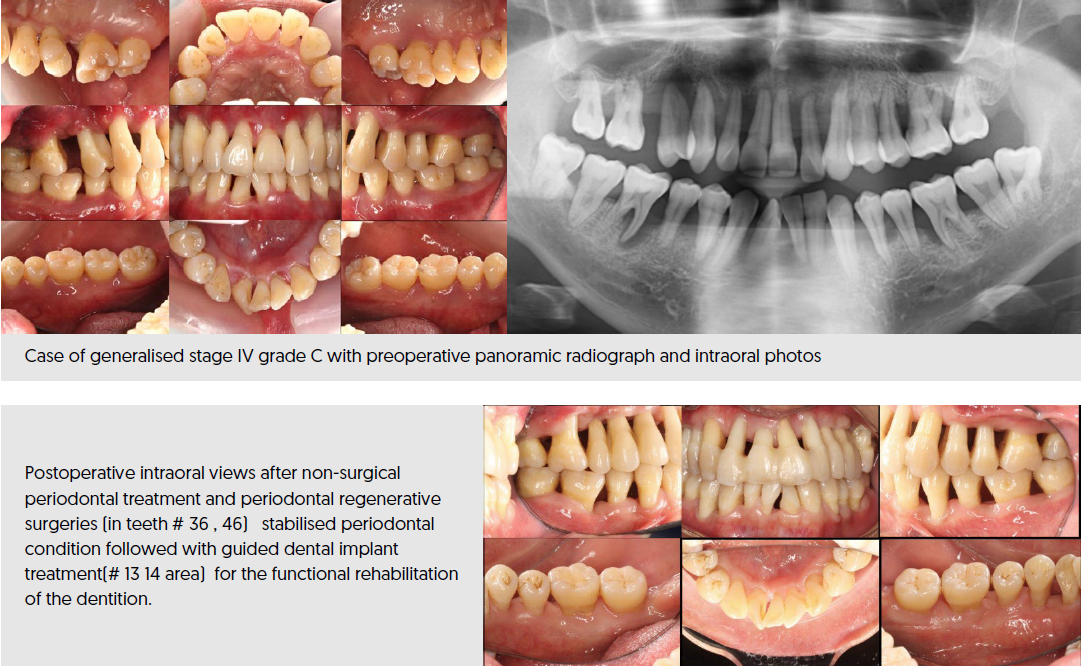Is Periodontitis still a major health challenge?
Unfortunately it is. Periodontitis is actually the sixth-most prevalent health condition globally. According to the Global Burden of Disease (2017) the prevalence of severe periodontitis was 11% affecting approximately 743 million people and contributing to 5 million years lived disability. As one of the major causes of tooth loss in adults that eventually leads to impaired masticatory function, periodontitis compromises dietary habits and nutritional intake (Kossioni 2018), psychosocial confidence and overall quality of life (Ferreira et al. 2017). There is a dose-dependent relationship between the severity and extent of periodontitis and its negative impact on the quality of life, i.e., a more severe stage of periodontitis will impose a greater impact on the quality of life (Buset et al. 2016). There is also a growing body of evidence associating periodontitis and systemic diseases. Periodontitis is independently associated with multiple chronic noncommunicable diseases of aging, including cardiovascular diseases (Tonetti & Van Dyke, 2013) and diabetes (Sanz et al., 2018) and may even increase the risk of mortality in selected populations (Sharma et al., 2016).
What is the situation in Hong Kong?
What is the situation in Hong Kong?
Hong Kong is no different to the global status, if not somewhat worse, as we have a high number of elderly population, many of whom belong to vulnerable or underprivileged groups. The problem however seems to start already from young age: in the first published study on the oral health of Hong Kong city's
18-year-olds, healthy gums were only 2% of the group (Lu et al
.2013). Unsurprisingly like elsewhere in the world, the periodontal condition deteriorates with age among Hong Kong people. Moving to the adults, only 1% of 35- to 44-year-old people had healthy gums. Eighty per cent of them had bleeding gums surrounding at least half of their teeth, and 40% had deep pockets. In the elderly population (over 65 years old), it was found that almost all (97%) of them had bleeding gums, and more than half (60%) presented deep pockets . Hence, the periodontal status indicates that people in Hong Kong need professional general and specialist periodontal care.
What is the stage IV Periodontitis and what are the challenges associated with these patients?
Stage IV Periodontitis is a term introduced in the latest consensus workshop in 2018 to describe the most advanced stage of the disease. It is characterised by severe attachment loss, tooth loss resulting in <20 remaining teeth (<10 opposing pairs) masticatory dysfunction tooth mobility grade ≥2, severe alveolar ridge defects; and occlusal collapse (tooth drifting, flaring). In the earlier presentation of stage IV periodontitis patients, there often are teeth that can be successfully treated, maintained, and remain functional for many years, therefore timely treatment is critical. Such treatment includes comprehensive periodontal therapy and often complex intervention such as regenerative surgery and rehabilitation with implant-supported fixed prostheses aiming at improving masticatory function, provide support for the remaining teeth and in some cases speech and aesthetics. So, it’s clear that there are major differences between the treatment of periodontitis in general and the treatment strategies and interventions required for the terminal stage. Most of the currently available evidence in the management of Stage IV Periodontitis is of low strength and is mostly based on expert opinion .Considerable time and efforts are needed from clinicians and patients. Added to this is the financial burden imposed from the treatment required. Therefore, it is not uncommon for these patients to either delay or postpone treatment, or resort to symptom-driven management. In turn, this leads to a vicious circle of disease progression and uncontrolled tooth loss, with growing negative impact on their quality of life and possibly systemic health.
What are the essential competences for the dental team in order to offer proper care to such patients?
What are the essential competences for the dental team in order to offer proper care to such patients?
As we discussed, patients at this stage of the disease suffer from multiple problems and there is high risk for rapid deterioration of the masticatory function. Consequently, complex treatment strategies have to be employed, which most likely go beyond the surgical periodontal therapy but also include prosthodontic interventions with or without dental implants and even orthodontics. Not to underestimate the behavioral aspects of treatment are significant, as patients have to share the burden of responsibility with clinicians and often make significant changes in their mindset and approach towards a healthy lifestyle. It becomes apparent that a wider multi-specialist team approach is essential and the early and comprehensive plan of the treatment might make the difference between success or failure and further down break of oral function. There is a lack of prospective studies related the changes in masticatory function and patient-reported outcome measures after each step of periodontal and rehabilitative therapy (Gennai et al. 2022). We hope our work in Hong Kong can soon add more to our abilities to treat these patients effectively.
You have recently received a major grant to design care for stage IV patients; tell us more about your plans!
Very recently, my team from the division of Periodontology and Implant Dentistry at the University of Hong Kong was awarded by the Azalea (1972) Endowment Fund the total amount of HK$11 million to launch a project that will allow us to treat more than 100 underprivileged Stage IV Periodontitis patients of Hong Kong. This treatment will of course take place under a very carefully organised team of multiple dental specialists in the Institute of Advanced Dentistry (IAD /HKU). We believe that this project, upon completion, will have a big social, educational and research impact both on local and international level. We will be able to deliver cutting edge care to a large number of patients in need, but at the same time we will improve our understanding of the effectiveness of periodontal and implant rehabilitation in stage IV periodontitis. At the same time we will disseminate this knowledge to all stakeholders in the society, not only raising awareness towards the importance of early treatment but also training many cohorts of new dentists and specialists who will then continue delivering care for many years in all sides of Hong Kong.



